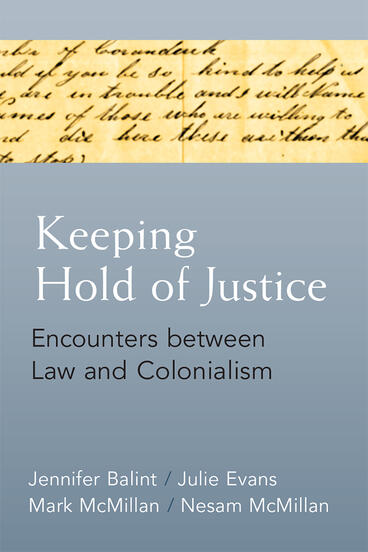Keeping Hold of Justice
Encounters between Law and Colonialism
Colonialism is a structural injustice embedded in law; what possibilities for justice remain?
Description
Keeping Hold of Justice focuses on a select range of encounters between law and colonialism from the early nineteenth century to the present. It emphasizes the nature of colonialism as a distinctively structural injustice, one which becomes entrenched in the social, political, legal, and discursive structures of societies and thereby continues to affect people’s lives in the present. It charts, in particular, the role of law in both enabling and sustaining colonial injustice and in recognizing and redressing it. In so doing, the book seeks to demonstrate the possibilities for structural justice that still exist despite the enduring legacies and harms of colonialism. It puts forward that these possibilities can be found through collaborative methodologies and practices, such as those informing this book, that actively bring together different disciplines, peoples, temporalities, laws and ways of knowing. They reveal law not only as a source of colonial harm but also as a potential means of keeping hold of justice.
Jennifer Balint is Head of School and Associate Professor in Socio-Legal Studies in the School of Social and Political Sciences, at the University of Melbourne.
Julie Evans is Principal Fellow of Melbourne Law School and Criminology, School of Social and Political Sciences, at the University of Melbourne.
Mark McMillan is Deputy Pro Vice-Chancellor of Indigenous Education and Engagement at RMIT University.
Nesam McMillan is Senior Lecturer in Global Criminology in the School of Social and Political Sciences at the University of Melbourne.
Reviews
“In short, Keeping Hold of Justice makes a sophisticated and innovative contribution to multiple fields and most especially to sociolegal studies.”
- Susan F. Hirsch
—Susan F. Hirsch, George Mason University
“The authors’ encouragement to take the methodology, and to apply it across different arenas of law, meant I related their ideas to my own thinking and my research. It is an inspiring text . . . There is no book that is comparable, in terms of its connections between transitional justice, international justice, and the role of law in colonialism.”
- Elizabeth Stanley
—Elizabeth Stanley, Victoria University Wellington
“The book makes an exceptional contribution by bringing together legal ‘meeting points’ across time and place to elucidate deep colonial legacies of structural injustice informing the present. Ultimately optimistic, the authors seek relational and inclusive ways of working with and through Indigenous and non-Indigenous laws to develop a system of structural justice.”
- Eve Darian-Smith, University of California Irvine
—Eve Darian-Smith, University of California Irvine
“This wonderfully generous book has its starting point in a sharp, clear-eyed appraisal of the historical forces that have produced structurally unjust systems of law in colonial contexts. What makes it stand out is the determination not only to identify structural injustice in such systems, but to collaborate in finding means of redress. The approach is one that I recognise from the authors, having been peripherally involved in their Minutes of Evidence project. Keeping Hold of Justice manifests their relentless optimism and collegiality even in the face of their devastating critique of the legal frameworks within which we live.”
- Alan Lester
—Alan Lester, University of Sussex
“This compelling interdisciplinary study urges us to grasp the possibilities that remain for fostering respectful relations between Indigenous and settler-colonial systems of law. It demonstrates how past records of Indigenous appeals for justice can be reactivated to generate new ‘meeting points’ between laws, making future structural justice still possible.”
- Dianne Otto
—Dianne Otto, Professorial Fellow, Melbourne Law School, Australia
“More than ever we need books like Keeping Hold of Justice. Too often attempts to theorise and remedy injustice remain at the level of surface engagement. This book, by contrast, confronts us with the depths and enduring pain of the colonial legacy of structural violence. Through a combination of historical and criminological analysis settler colonialism’s most blatant, as well as its most hidden, crimes are revealed, named and challenged.
In re-imagining the possibilities of structural justice the authors introduce us to a relational engagement with ethics and politics which calls on us all to accept collective responsibility for the structural injustice that informs our lives and in turn to fight that injustice through collective action. In the times in which we live, there can be no more important message.”
- Penny Green
—Penny Green, Queen Mary University of London
“Ranging widely, from pivotal colonial encounters in Australia to the Rwanda Tribunal and the litigation generated by British rule in Kenya, Keeping Hold of Justice is an exemplary exploration of the nature of law, the character of colonialism and the structural injustices it creates. It powerfully and poignantly argues how, despite its imbrication in colonial rule, the law–and the record it creates–may still be a means of beginning to develop relations of justice out of the ruins of colonial devastation. Written with exceptional clarity this an important contribution to the literature on colonialism, its aftermath, and the potentialities of the law to make good on its claims to achieve justice.”
- Antony Anghie
—Antony T. Anghie, University of Utah S.J. Quinney College of Law
Honorable Mention: Law, Literature and Humanities Association of Australasia (LLHAA) 2021 Penny Pether Prize
- LLHAA Penny Pether Prize

